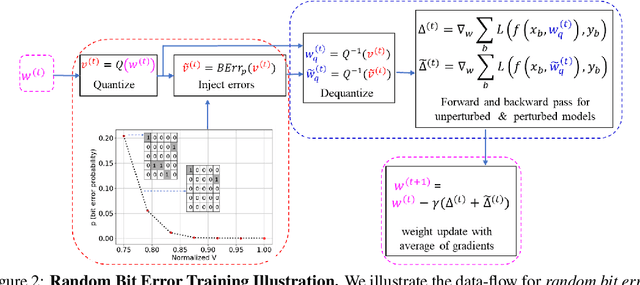Nandhini Chandramoorthy
BERRY: Bit Error Robustness for Energy-Efficient Reinforcement Learning-Based Autonomous Systems
Jul 19, 2023



Abstract:Autonomous systems, such as Unmanned Aerial Vehicles (UAVs), are expected to run complex reinforcement learning (RL) models to execute fully autonomous position-navigation-time tasks within stringent onboard weight and power constraints. We observe that reducing onboard operating voltage can benefit the energy efficiency of both the computation and flight mission, however, it can also result in on-chip bit failures that are detrimental to mission safety and performance. To this end, we propose BERRY, a robust learning framework to improve bit error robustness and energy efficiency for RL-enabled autonomous systems. BERRY supports robust learning, both offline and on-board the UAV, and for the first time, demonstrates the practicality of robust low-voltage operation on UAVs that leads to high energy savings in both compute-level operation and system-level quality-of-flight. We perform extensive experiments on 72 autonomous navigation scenarios and demonstrate that BERRY generalizes well across environments, UAVs, autonomy policies, operating voltages and fault patterns, and consistently improves robustness, efficiency and mission performance, achieving up to 15.62% reduction in flight energy, 18.51% increase in the number of successful missions, and 3.43x processing energy reduction.
NeuralFuse: Learning to Improve the Accuracy of Access-Limited Neural Network Inference in Low-Voltage Regimes
Jun 29, 2023Abstract:Deep neural networks (DNNs) have become ubiquitous in machine learning, but their energy consumption remains a notable issue. Lowering the supply voltage is an effective strategy for reducing energy consumption. However, aggressively scaling down the supply voltage can lead to accuracy degradation due to random bit flips in static random access memory (SRAM) where model parameters are stored. To address this challenge, we introduce NeuralFuse, a novel add-on module that addresses the accuracy-energy tradeoff in low-voltage regimes by learning input transformations to generate error-resistant data representations. NeuralFuse protects DNN accuracy in both nominal and low-voltage scenarios. Moreover, NeuralFuse is easy to implement and can be readily applied to DNNs with limited access, such as non-configurable hardware or remote access to cloud-based APIs. Experimental results demonstrate that, at a 1% bit error rate, NeuralFuse can reduce SRAM memory access energy by up to 24% while improving accuracy by up to 57%. To the best of our knowledge, this is the first model-agnostic approach (i.e., no model retraining) to address low-voltage-induced bit errors. The source code is available at https://github.com/IBM/NeuralFuse.
Random and Adversarial Bit Error Robustness: Energy-Efficient and Secure DNN Accelerators
Apr 16, 2021



Abstract:Deep neural network (DNN) accelerators received considerable attention in recent years due to the potential to save energy compared to mainstream hardware. Low-voltage operation of DNN accelerators allows to further reduce energy consumption significantly, however, causes bit-level failures in the memory storing the quantized DNN weights. Furthermore, DNN accelerators have been shown to be vulnerable to adversarial attacks on voltage controllers or individual bits. In this paper, we show that a combination of robust fixed-point quantization, weight clipping, as well as random bit error training (RandBET) or adversarial bit error training (AdvBET) improves robustness against random or adversarial bit errors in quantized DNN weights significantly. This leads not only to high energy savings for low-voltage operation as well as low-precision quantization, but also improves security of DNN accelerators. Our approach generalizes across operating voltages and accelerators, as demonstrated on bit errors from profiled SRAM arrays, and achieves robustness against both targeted and untargeted bit-level attacks. Without losing more than 0.8%/2% in test accuracy, we can reduce energy consumption on CIFAR10 by 20%/30% for 8/4-bit quantization using RandBET. Allowing up to 320 adversarial bit errors, AdvBET reduces test error from above 90% (chance level) to 26.22% on CIFAR10.
On Mitigating Random and Adversarial Bit Errors
Jun 24, 2020



Abstract:The design of deep neural network (DNN) accelerators, i.e., specialized hardware for inference, has received considerable attention in past years due to saved cost, area, and energy compared to mainstream hardware. We consider the problem of random and adversarial bit errors in quantized DNN weights stored on accelerator memory. Random bit errors arise when optimizing accelerators for energy efficiency by operating at low voltage. Here, the bit error rate increases exponentially with voltage reduction, causing devastating accuracy drops in DNNs. Additionally, recent work demonstrates attacks on voltage controllers to adversarially reduce voltage. Adversarial bit errors have been shown to be realistic through attacks targeting individual bits in accelerator memory. Besides describing these error models in detail, we make first steps towards DNNs robust to random and adversarial bit errors by explicitly taking bit errors into account during training. Our random or adversarial bit error training improves robustness significantly, potentially leading to more energy-efficient and secure DNN accelerators.
 Add to Chrome
Add to Chrome Add to Firefox
Add to Firefox Add to Edge
Add to Edge